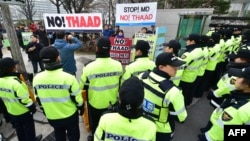The potential deployment of a sophisticated U.S. air defense system in South Korea to counter the North's missile threat is proving a headache for Seoul as it tries to walk a fine line between its closest security ally Washington and its biggest trade partner China.
Since June, U.S. military officials have said the Terminal High Altitude Area Defense (THAAD) system was needed in South Korea given Pyongyang's growing missile arsenal, although there has been no formal proposal from Washington.
While China initially said little about such a deployment, it has begun to express opposition, prompting some lawmakers in Seoul to express concern over the possible fallout on ties. At the same time, other MPs have said basing THAAD batteries in South Korea would strengthen the country's security alliance with Washington.
The wrangle comes as Seoul also debates whether to join a Chinese-led development bank that the United States opposes.
Missile system
The THAAD system, which is designed to intercept ballistic missiles at high altitude, has radar that can track objects 2,000 kilometers (1,200 miles) away, a range that would include much of the Chinese mainland.
“It is a delicate issue when we look at South Korea-U.S. relations and South Korea-China relations,” said a South Korean government official with knowledge of the matter but who declined to be identified. “We are aware of China's concerns.”
With the issue dominating headlines in South Korean media, the government has stressed there have been no talks so far with Washington over the system.
“This government's position is 'three No's',” presidential Blue House spokesman Min Kyung-wook told a briefing last week. “There has been no request, so there has been no consultation and therefore there is no decision.”
The United States is South Korea's closest ally, and maintains 28,500 military personnel in the country, a legacy of the 1950-53 Korean War, which ended in a truce and left the two Koreas in a technical state of war.
Earlier this month, General Vincent Brooks, head of the U.S. Army Pacific Command, told Reuters that THAAD batteries were urgently needed in South Korea given the willingness of North Korea to use its missile systems.
He told a separate think tank audience in Washington that the increased range and precision of North Korean missiles were “of great concern” and represented a physical threat to U.S. territory.
Costly system
The THAAD system is built by Lockheed Martin Corp, and costs an estimated 1 trillion won ($885.6 million) apiece. Some THAAD opponents in South Korea propose instead developing an indigenous missile defense system.
China's Foreign Ministry said the potential deployment of THAAD batteries “exceeds actual security needs, and will put renewed stress on the already fragile situation on the Korean peninsula.”
“We urge the relevant countries to be extra cautious, and think twice before acting,” it said in a statement to Reuters. Russia has expressed similar opposition.
China is South Korea's biggest trading partner, with $235.4 billion in two-way trade in 2014 dwarfing the $115.6 billion total with the United States. South Korean President Park Geun-Hye and Chinese President Xi Jinping have forged close ties, holding six summit meetings since both took office in 2013.
Beijing is also North Korea's main ally, although its relations with Pyongyang have cooled.
Protection of citizens
During a visit to Seoul on Tuesday, the U.S. Assistant Secretary of State for East Asian and Pacific Affairs, Daniel Russel, said the U.S. and South Korean militaries have an obligation to protect their citizens.
“I find it curious that a third country would presume to make strong representations about a security system that has not been put in place and that is still a matter of theory,” he said.
South Korean Defense Ministry spokesman Kim Min-seok said neighboring countries should not try to influence Seoul's security policies.
But another South Korean government official underscored the bind for Seoul, saying: “If the United States wants to deploy (THAAD) as part of its military operation, we're in no position to say they should or shouldn't do it.”





